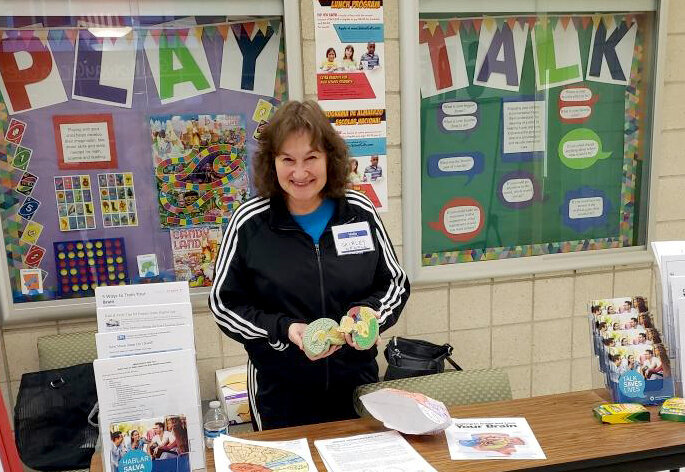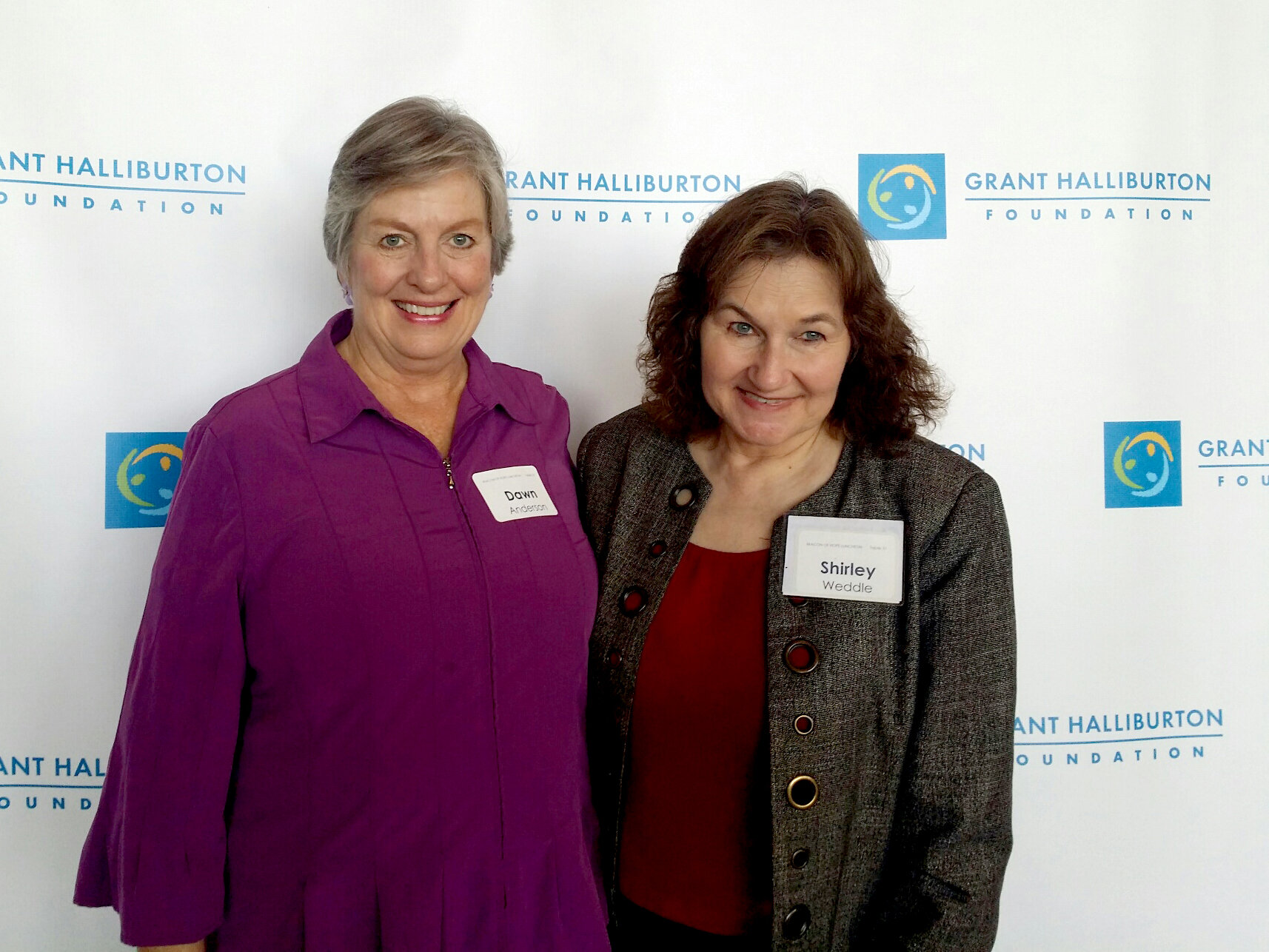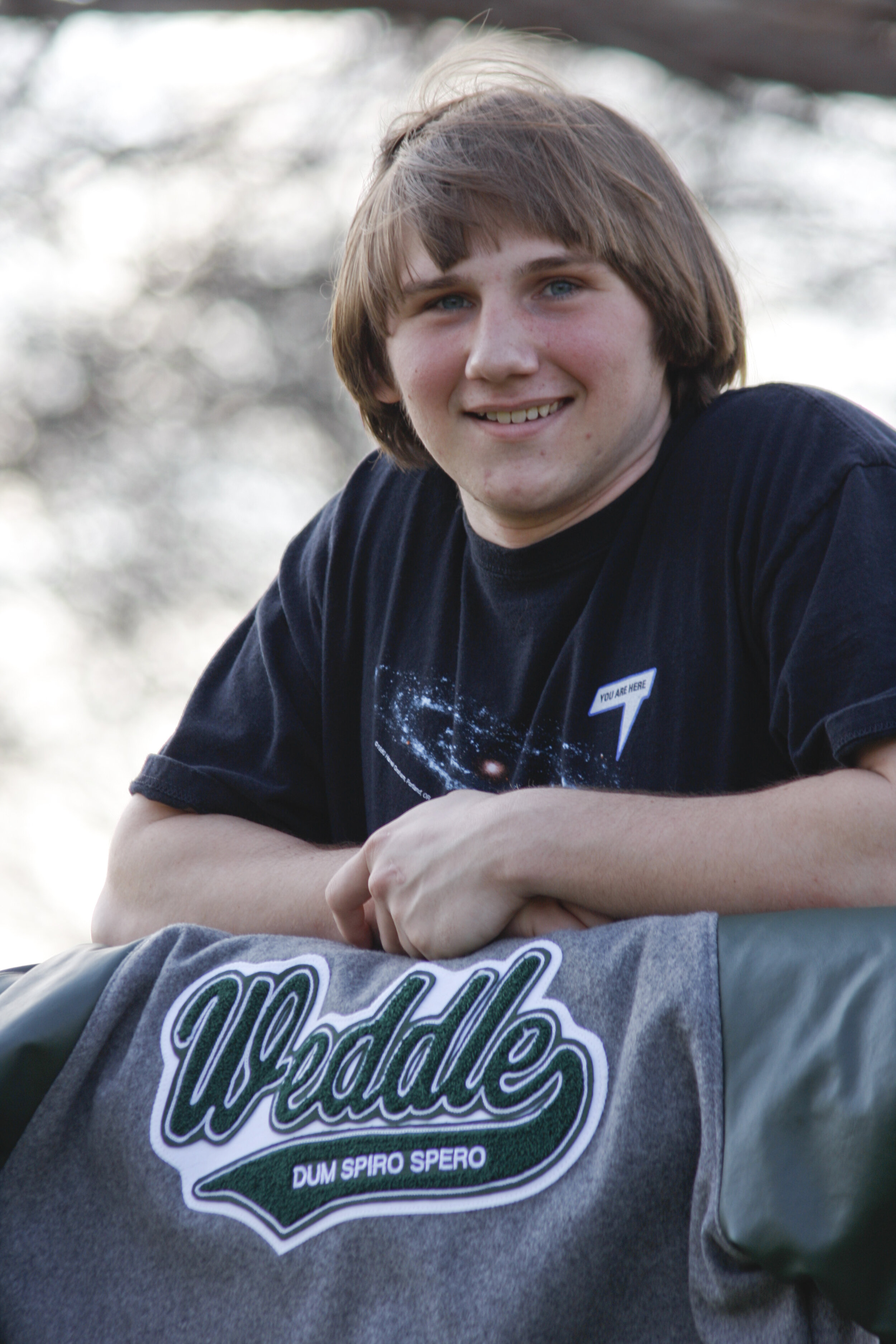Story by Mary Martin. Photos courtesy of Shirley Weddle.
At the end of June in 2014, Shirley Weddle thought the stress and anxiety her son Matthew was experiencing was typical college student stress. But under the surface Matthew was facing lack of sleep, a disrupted exercise routine, along with social and relationship pressures. It was that summer, on July 6, that Shirley lost her son to suicide.
“We didn’t know what we didn’t know,” says Shirley.

Shirley presenting about brain health at a local elementary school in early 2020.
In the years following Matthew’s death, Shirley has devoted her time to volunteering full time with support groups and brain health projects, turning her background as a medical imaging specialist toward mental health research, connecting with the team at UTD’s Center for BrainHealth. “I am continually having conversations around brain health and how we can reduce the stigma around mental health and suicide,” says Shirley. “We need to talk about it like any other ache or pain. Just like with diabetes, we need to learn about it and control it. Suicide is like a brain attack as opposed to a heart attack. Stressors add up like drops of water into a glass until the water finally overflows the brim.”
Often acting as a bridge between organizations and survivors, Shirley has found herself working with school districts, veteran hospitals, researchers, and churches. In each space, Shirley encourages the teams at the front line of mental health innovation and helps to coordinate communication between the various groups, each which play a critical role in educating about mental health and preventing suicide.
Dawn Anderson with Shirley Weddle at a Grant Halliburton Foundation event in early 2020.
In the midst of her advocacy, Shirley is also on a journey with her own grief. In the years that followed Matthew’s death, she met Pastor Dawn Anderson, who, at the time, was a care pastor at Highland Park United Methodist Church. Shirley joined a support group at the church specifically for survivors of suicide loss. “When I first began, I couldn’t even say the word suicide,” admits Shirley. She continued in the group, surrounded by a compassionate community, where she learned about resources like the American Foundation for Suicide Prevention. Now Shirley has gathered all of the compassion and teaching she received, and makes herself available for conversations with other suicide loss survivors who may not be ready for a support group.
Matthew Weddle, in 2010.
The driving force behind all of Shirley’s work continues to be the legacy of her son, and preventing more loss from suicide, which holds the spot for second leading cause of death in young people age 10-34. “Young people feel so much stress nowadays starting at a young age and continuing into college,” says Shirley. “They push themselves hard to perform well and can get frustrated when there are issues, not realizing that their brains are still developing or understanding the significance of changes in sleep, diet, exercise and stress management. Those that are high academic achievers and/or highly artistic seem to be especially affected based upon talking to many survivors over the past few years. They have not had the chance to build resilience or been exposed to tools to help them understand or cope with these feelings, so they hide them and try to deal with them internally which does not always work without help.”
Shirley has turned her own loss into a brave movement forward, helping others to find their own next step on the path of grief and understanding how to dismantle the stigma around mental health. “For those who have lost someone to suicide and are grappling with understanding the why and the what ifs and regrets, please let them know that we each do the best we can with what we know,” says Shirley. “It seems that new information and realizations are continually being recognized about the brain which gives us hope for the future where people recognize mental health is brain health, objective imaging techniques are used to diagnose and monitor treatment, stigma is removed and everyone feels free to talk openly about their feelings and struggles and get the help they need.”
The Weddle family continues to invest in the next generation of brain health research through a neuroscience scholarship at UTD in Matthew’s name. Matthew was a Senior Computer Science Major with interests in Artificial Intelligence, Neuroscience and Machine Learning at UTDallas, where he lived in the college apartments. “He read textbooks for fun,” Shirley remembers. “In a biography paper he wrote in high school, he said he wanted to make a positive difference in the world and wanted to be remembered for his smile and for being kind.”
Shirley, with a team from UTD’s student counseling department in 2019.
While attending a national Medical Imaging management conference a couple of years after losing Matthew, Shirley heard, as part of a presentation, excerpts from Dr Daniel Amen’s Ted Talk on the use of medical brain imaging in psychiatry to treat mental conditions with more precision. “I was in tears after the presentation because it made so much sense and gave me hope that there could be an objective means using medical imaging to see these conditions and potentially help prevent suicide,” says Shirley. She could clearly see the possibilities of collaboration, and this upcoming July she will present her findings at the AHRA Conference for medical imaging managers. “I am so grateful to have the opportunity to share what I have learned with my colleagues who can then go back and help their co-workers, family and friends,” says Shirley. “Our profession is like a giant family whose members are always there for each other.”
Along with her determined championing of the newest and best research, Shirley is also holding space for the healing that must happen in the survivor community. “We cannot change the past, but we can seek knowledge about brain health and suicide prevention and share that knowledge with individuals of all ages in all settings, supporting each other,” she says. “By doing this, we honor our loved ones and help them continue to live and serve through us.”
If you or someone you know is experiencing a mental health crisis or suicidal thoughts, please dial 1-800-273-8255 for the National Suicide Prevention Lifeline or text TALK at 741741. For help finding a mental health resource, call the Here for Texas Mental Health Navigation Line at 972-525-8181.


